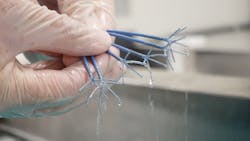FDA grants clearance to reprocess the PENTARAY Nav Eco High-Density Mapping Catheter
Innovative Health, the single-use cardiology medical device reprocessing company, has announced clearance from the Food and Drug Administration (FDA) for reprocessing the PENTARAY Nav eco High-Density mapping catheter, which the company says is a development that represents both a technological and healthcare cost reduction milestone.
The PentaRay is a key medical device in Atrial Fibrillation (AF) procedures, one of the fastest growing and most expensive procedures in hospitals today. “Electrophysiology procedures that diagnose and treat atrial fibrillation are a very fast-growing procedure area, projected to double in size between 2014 and 2024,” Lars Thording, VP, Marketing & Public Affairs, Innovative Health, told Healthcare Purchasing News. “This growth is due to advances in electrophysiology treatment of atrial fibrillation combined with demographic shifts. However, the procedures involve not only a highly trainedHowever, Innovative Health asserts that hospitals utilizing the reprocessed PentaRay and other expensive single-use, labeled cardiology devices can save thousands of dollars on each AF procedure, potentially opening the procedure up for more patients. The PentaRay catheter, originally manufactured by Biosense Webster, is an advanced technology that is widely regarded as the leading cardiology mapping catheter. Its capabilities include high resolution mapping and coverage of all four chambers of the heart, which the manufacturer associates with reduced procedure and fluoroscopy time.
In the past, the device geometry provided a challenge for reprocessing and use a second time, because it contains microlumen technology (channels the size of a human hair), and an FDA clearance requires cleaning and testing access to all areas of the device. In this instance, Innovative Health collaborated with the FDA through the pre-submission process to seek their guidance on appropriate test methods for reprocessing this device. Through this interaction, Innovative Health created entirely new protocols and standards for reprocessing the device. This included state-of-the-art processes for removing blood and Heparin out of the microlumen, and rigorous testing to ensure that these efforts were effective. Innovative Health’s own protocols also involved ensuring that the device was compatible with the entire CARTO 3 mapping system and that it meets specifications equivalent to the new device.
The new standards and processes used to reprocess the PentaRay will allow Innovative Health to reprocess other similar devices using microlumen technology, which is becoming dominant in AF ablation procedures.
“With the clearance to reprocess PentaRay, we have achieved two important things,” said Innovative Health CEO Rick Ferreira, in a statement. “We have made it possible for hospitals to reduce AF ablation medical device costs by as much as 30 percent, and we have demonstrated that reprocessing engineering can break boundaries traditionally considered to be unbreakable. We will continue to work with hospital cardiology units, FDA and clinicians to expand cardiology reprocessing, so that these procedures can become economically viable, and therefore more successful and more widely available, while always keeping patient safety as our top priority.”
Thording provided HPN with specific ways the device can lead to significant cost savings. “Specifically, medical device costs in pulmonary vein isolation cases (the most common atrial fibrillation procedures) are typically around $10,000. Given that CMS reimbursement is under $20,000, this leaves the hospital very little room to staff and operate the EP lab without facing an economic loss on the procedures. Reducing the cost of medical devices is really the only way the hospital can ensure the economic viability of CMS reimbursed atrial fibrillation procedures.
“Out of the10-plus difference devices used in an atrial fibrillation case, a handful are very expensive – up to $3,500 per device – and some of these can be reprocessed,” continued Thording. “Specifically, some mapping catheters, diagnostic electrophysiology catheters, introducer sheaths and diagnostic ultrasound catheters can be used a second time through reprocessing. In a pulmonary vein isolation case, the combined savings from using these reprocessed devices instead of new ones is over $3,000 per procedure, or about 30 percent of the total device costs. Reprocessed diagnostic ultrasound catheters are typically $1,200 less than new ones, reprocessed mapping catheters are typically $900-plus less than new ones.
“The challenge is that when electrophysiology device manufacturers come out with new technologies, such as the Pentaray eco catheter, they lose these savings, until a reprocessor gains clearance to reprocess it. Innovative Health’s clearance of the reprocessed Pentaray catheter allows hospitals to sustain and grow these critical cost savings.”

